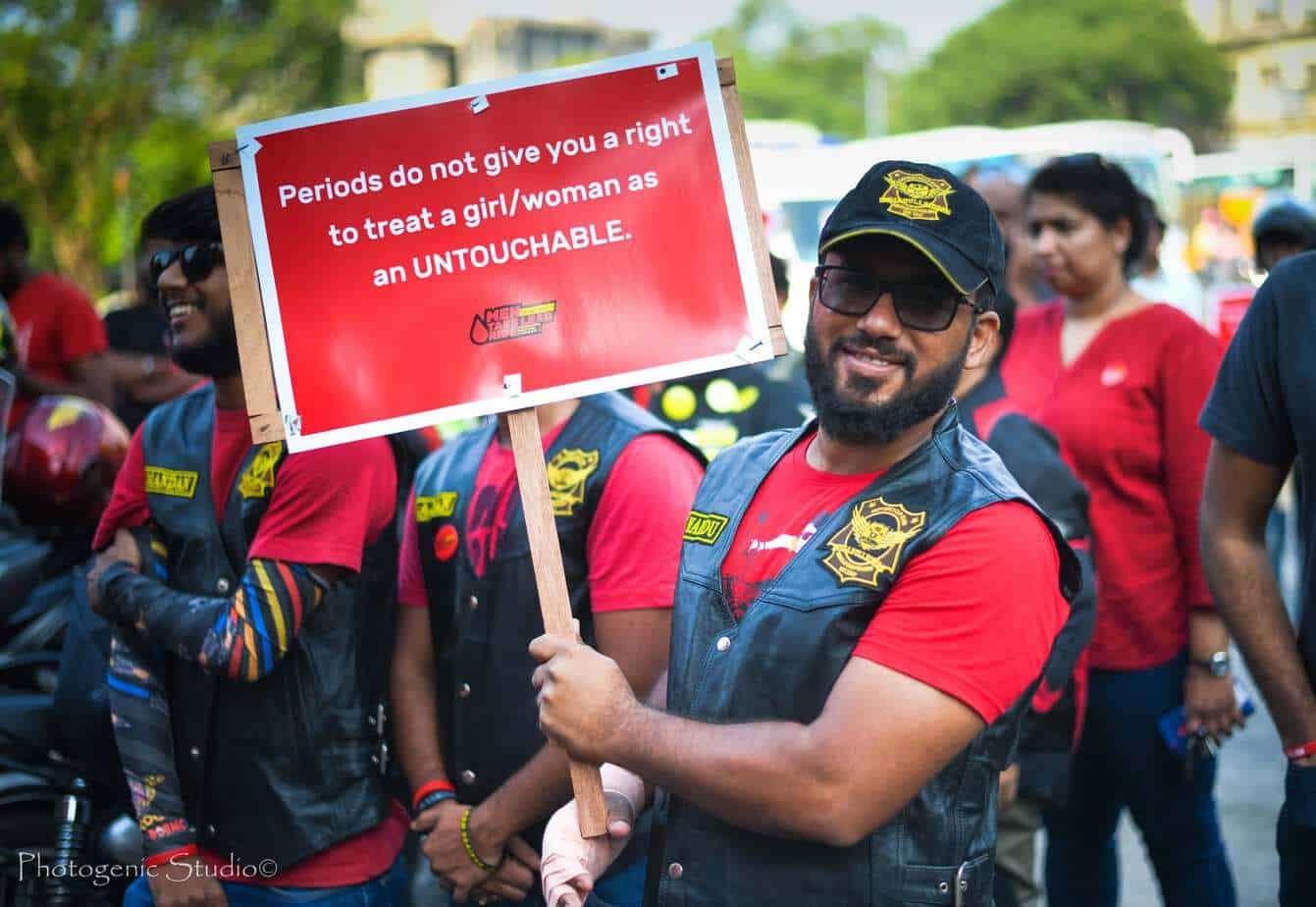Around 120 bike riders participated in the ‘Men Take Lead Ride 2019’ on Sunday, to commemorate the international Menstrual Hygiene (MH) Day. World over, MH Day is being observed today, May 28th, to bring attention to girls’ and women’s health and empowerment.
The theme of this year’s ‘Men Take Lead Ride’ was to address the issue of isolation and untouchability around mensuration. It was organised by the Bengaluru-based NGO Breaking the Silence Worldwide Foundation, in partnership with the motorcycle club India Bull Riders and Radio Active 90.4 MHz.
Shreya Krishnan, Mrs India 2017, flagged off the ride on Sunday. Eminent women activists like Cynthia Joseph and Jacintha Jay attended the event to support the cause.
The 40-km men’s bike rally started from Townhall, followed the route through Mekhri Circle, ISKCON Temple, PES College, Deve Gowda petrol bunk, JP Nagar, Silk Board and BDA Complex HSR. Length of the ride was fixed at 40 kms to signify the 40 years a woman menstruates in her lifetime.
A menstruating woman in India is considered dirty, polluting, impure, untouchable, and is isolated from family, community and society during periods. In Tamil Nadu, a 14-year old girl died on 16th November in a cyclone, after being forced to sleep in a hut isolated from her home because she was menstruating.
As per a 2016 study, out of every 100 girls in India, 77 cannot enter places of worship or pray when on their periods, 50 cannot touch people or special food items, and 26 are forced to sleep separately during periods.
Menstrual Hygiene Management (MHM) has been recognised as being linked to three Sustainable Development Goals (SDGs) – Good health and well-being (SDG number 3), Gender equality (SDG no. 5), Clean water and sanitation (SDG no. 6). This is because menstrual hygiene is a critical part of girls’ and women’s health, and affects the health of the family. Menstrual hygiene is also linked to gender inequality that rests deep in our culture, and access to clean water and sanitation infrastructure. Over the last few years, government departments and civil society organisations within India and abroad have been implementing MHM programmes.
Urmila Chanam, Founder and CEO of Breaking the Silence Worldwide Foundation, said that the bike rally was a symbolic event. “The aim is to give people the message that there is a need to involve men in the movements on women’s issues. This is a social movement to make menstrual hygiene a reality. What good is ensuring the availability of sanitary napkins or products, if we cannot address the most basic human need for dignity?” she asked.
This is the second edition of the ‘Men Take Lead Ride’. The first edition, held in 2017, was recognised as one of the leading events in the world on MH Day, by the Berlin-based Menstrual Hygiene Day Secretariat and the non-profit WASH United. The ride was also acknowledged by international development agencies and practitioners in the WASH (Water Sanitation and Hygiene) sector as an innovative approach to achieve MHM.
Chris Bobel, Professor at the University of Massachusetts Boston, USA, has written about ‘Men Take Lead Ride’ in her book ‘The Managed Body: Developing Girls and Menstrual Health in the Global South’. She refers to the event as a “solution demonstration of a new kind of leadership that will address women’s issues. And this is important. For eg., when it comes to rape, women activists have worked for decades by sensitising girls to be safe and pushing laws and policies, but rape has not stopped. This is because the leadership is only confined to women fighting for women. Men need to step in; they are great partners in this cause. We have been assuming that men are only the problem, but they can be part of the solution.”

Men can be part of the solution. Pic: Kumar Saurav
Nujo John, a bike rider and one of the managers of ‘Men Take Lead Ride’, said, “Compared to other cities, Bengaluru is one of the safest places for women in India. So, it should not come as a surprise that this movement, to make the world a better place for girls and women, comes from here.”
Pinky Chandran, the Director of Radio Active, Bengaluru’s first community radio station, said, “Radio Active is all about nurturing voices of the people. ‘Men Take Lead Ride’ is such an important platform for building men’s voices on a topic like menstruation that’s been shrouded in silence and shame for generations. When men begin talking about menstruation, it will serve to normalise menstruation and aid good health.”
The rally ended with men leading the pledge to never isolate girls and women on periods, and to intervene and sensitise people upon coming across such incidents.
Note: Akanksha Choudhary contributed to this article